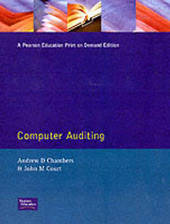
|
Computer Auditing
Paperback
Main Details
| Title |
Computer Auditing
|
| Authors and Contributors |
By (author) Andrew D. Chambers
|
|
By (author) J.M. Court
|
| Physical Properties |
| Format:Paperback | | Pages:288 | | Dimensions(mm): Height 246,Width 186 |
|
| Category/Genre | Management accounting and bookkeeping
Computer science |
|---|
| ISBN/Barcode |
9780273032410
|
| Classifications | Dewey:657.450285 |
|---|
| Audience | | Professional & Vocational | |
|---|
| Edition |
3rd Revised edition
|
| Illustrations |
bibliography, index
|
|
Publishing Details |
| Publisher |
Pearson Education Limited
|
| Imprint |
Financial Times Prentice Hall
|
| Publication Date |
17 June 1991 |
| Publication Country |
United Kingdom
|
Description
The 1990s takes us into the third age of computer auditing - the age of mature theory, recognized best practice and distinctive professional qualifications. The third edition of "Computer Auditing" which incorporates an extensive rewrite of many sections, a large amount of new material and a major change in presentation - reflects the maturity of the state of the art. The book is primarily addressed to the auditor who is not a technical specialist - but who, being an auditor, needs to be a computer auditor. However, the text addresses the relevant technical issues to the necessary extent. No auditor, being a computer auditor, can avoid them, or should wish to do so. We can at last say that all auditors are indeed computer auditors - though some do still need to be more technically specialized than others. This third edition reflects the increasing pace of implementation of information technology. New material covers such subjects as: trends in IT and their impact on auditors; audit of forward planning; developments in networks, electronic data interchange and multi-user systems; automated auditing procedures; use of packages (either on their own or in conjunction with systems developed in-house); variety in methods of developing systems; user developing and implementing their own systems with limited (if any) recourse to technical specialists; legal developments. We have also sought to include more material in the form of checklists and questionnaires. We believe that audit is, above all, a set of practical tasks rather than theoretical exercises.
|